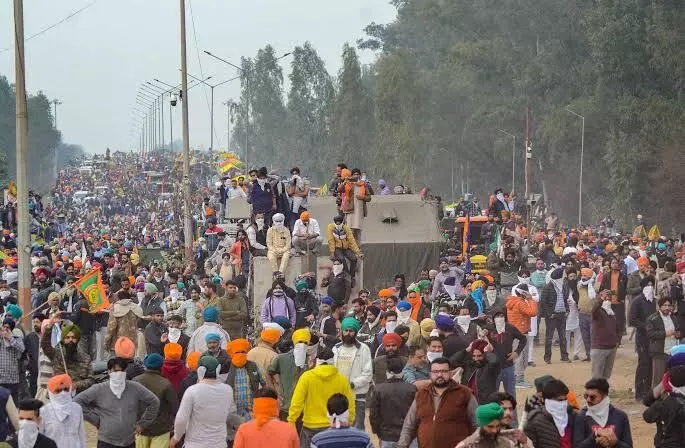Delhi Under Siege: Farmers Clash with Police in Renewed Protest for Minimum Prices

Ambala/New Delhi: Tense scenes unfolded on the outskirts of Delhi on Tuesday as police fired tear gas to disperse thousands of farmers marching towards the capital, demanding guaranteed minimum prices for their crops. The city, reminiscent of a fortress, was ringed by razor wire, concrete blocks, and fencing, aimed at keeping protests at bay.
Memories of the year-long agitation in 2020, which forced the government to repeal controversial farm laws, loomed large. While those demands were met, farmers say other promises remain unfulfilled, igniting their renewed outrage.
Thick clouds of tear gas billowed near Ambala, 200 kilometers north of Delhi, as police attempted to restrain the surging tide of protesters. Similar scenes unfolded at the Shambhu border between Haryana and Punjab, where police deployed drones to drop tear gas canisters directly on the crowd.
"It rained tear gas shells literally throughout the day," reported a BBC Punjabi journalist caught in the melee. Injuries were reported, primarily from plastic bullets fired by police, triggering retaliatory stone-pelting from some demonstrators. Farmers used wet clothing and sacks in a desperate attempt to shield themselves from the choking gas.
Despite the heavy-handed tactics, farmers, primarily from Punjab, remain determined to reach Delhi peacefully. They assert their right to cross Haryana and engage in dialogue with the government. Scuffles at the Shambhu border highlight the simmering tension, threatening to escalate the situation further.
The 2020 farmers' protest, which saw protesters camped out for months, emerged as a major challenge to Prime Minister Narendra Modi's government. With general elections looming this year, the Bharatiya Janata Party (BJP) is eager to avoid alienating this influential voting bloc.
Traffic disruptions and jams gripped Delhi on Tuesday as authorities clamped down, blocking roads and diverting traffic. Large gatherings were banned across the city, including at border points, effectively sealing Delhi from the approaching farmers.
The BJP-led Haryana government took the unprecedented step of suspending internet services in seven districts to curb potential communication and mobilization among protesters.
Two rounds of talks between farm union leaders and government ministers have failed to yield any breakthrough. Farmers remain adamant about their core demands, including guaranteed minimum support prices (MSP) for their produce and the fulfillment of the government's promise to double farmers' income.
With negotiations stalled and frustration mounting, farmers' and trade unions have announced a nationwide rural strike on February 16th. No agricultural activities will be undertaken, shops and markets will remain shut, and major roads will be blocked in villages across the country.
As the farmers' march towards Delhi continues, the government faces a critical juncture. Will it engage in meaningful dialogue and address their concerns, or risk reigniting the embers of a simmering discontent that could potentially derail its electoral ambitions? Only time will tell.
